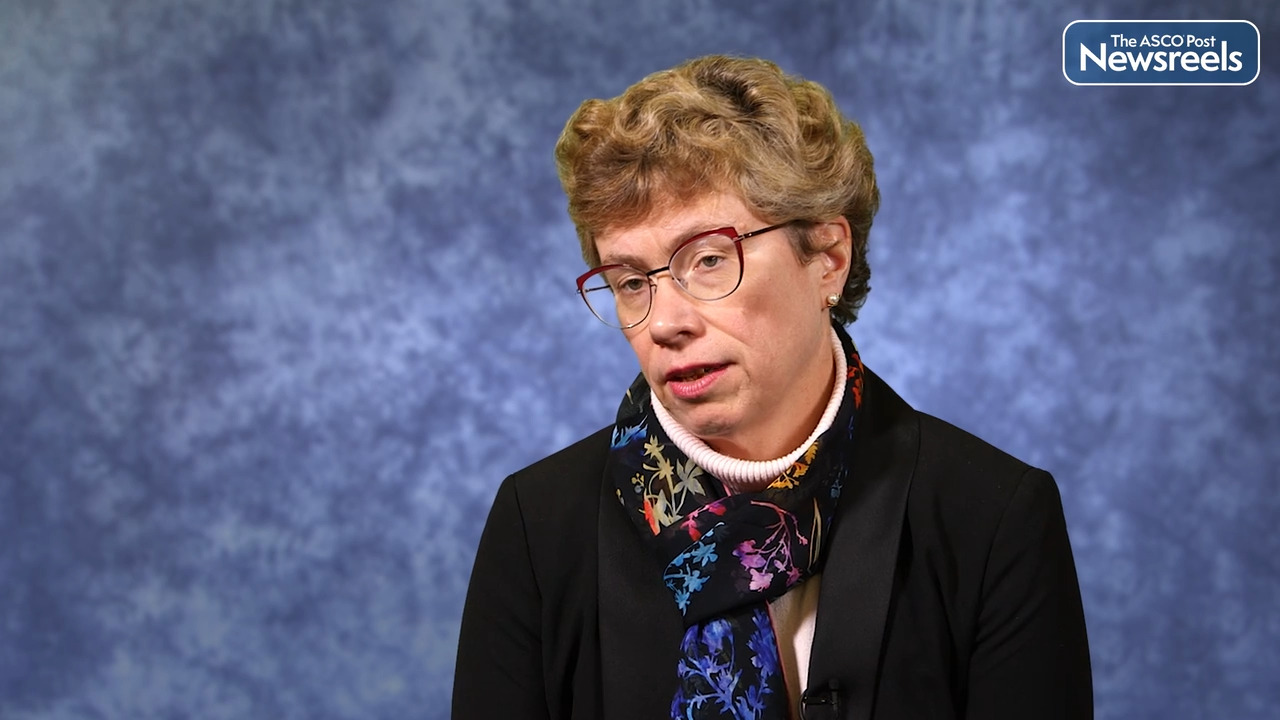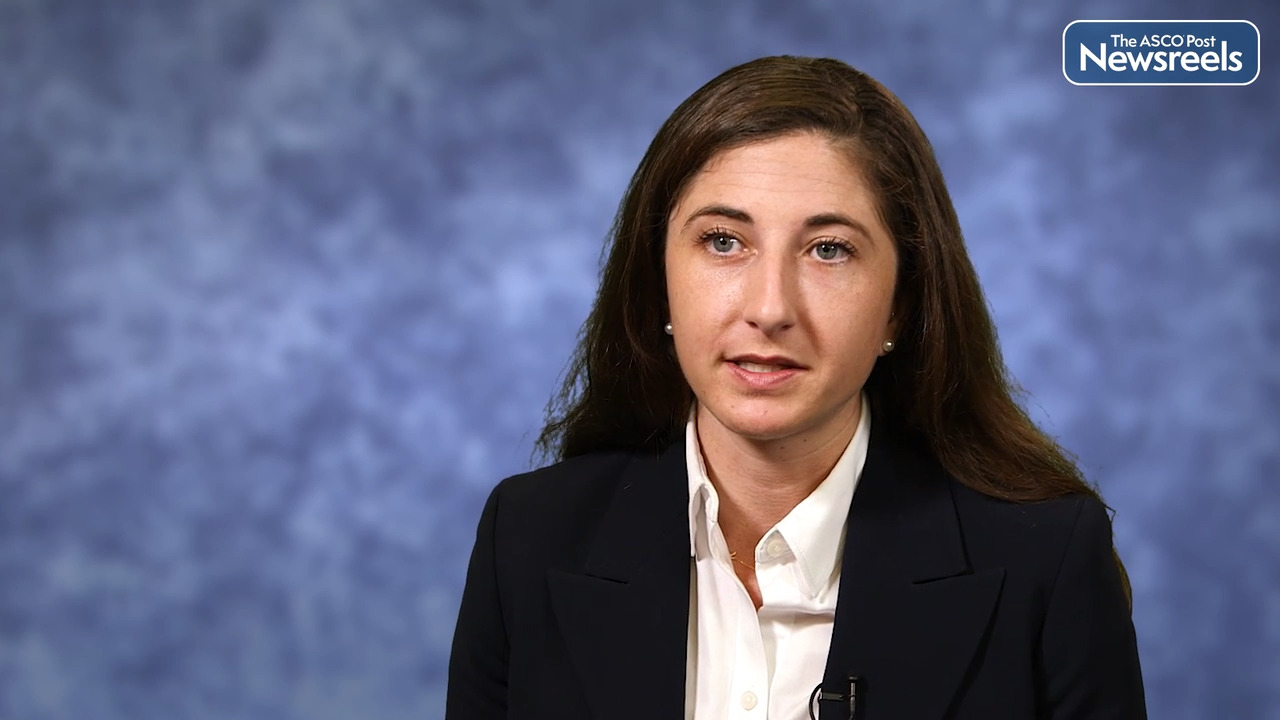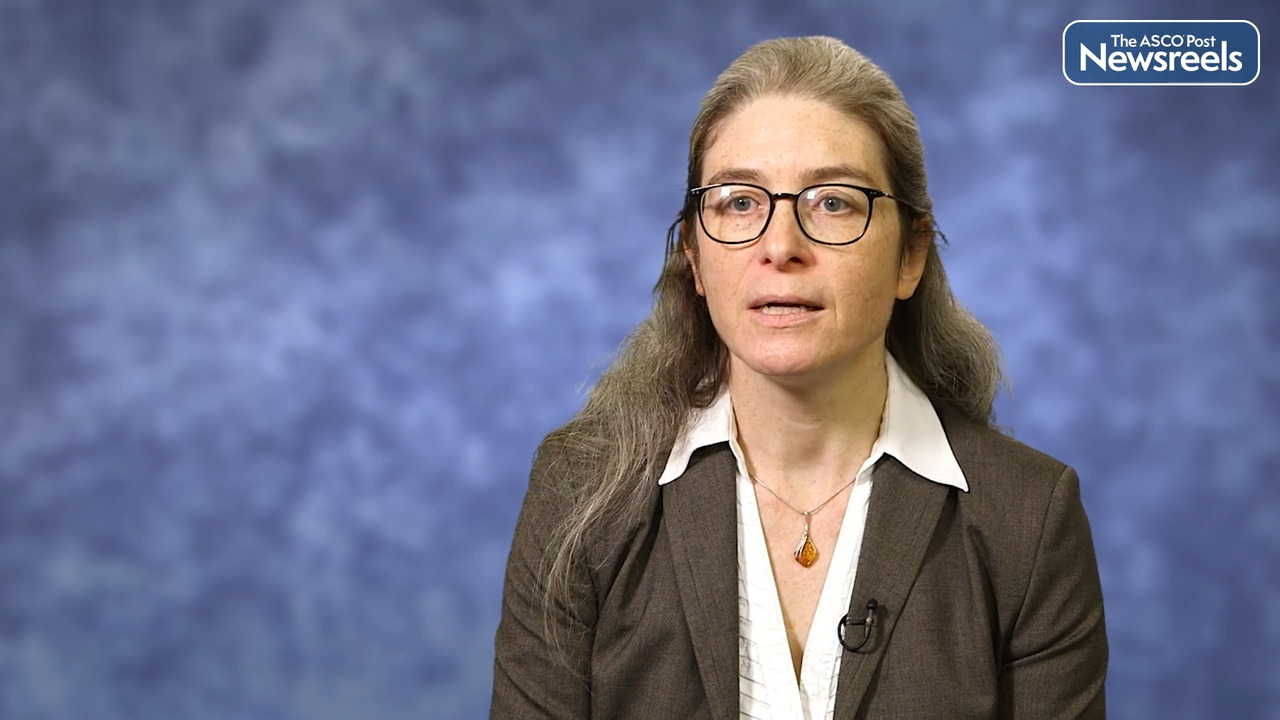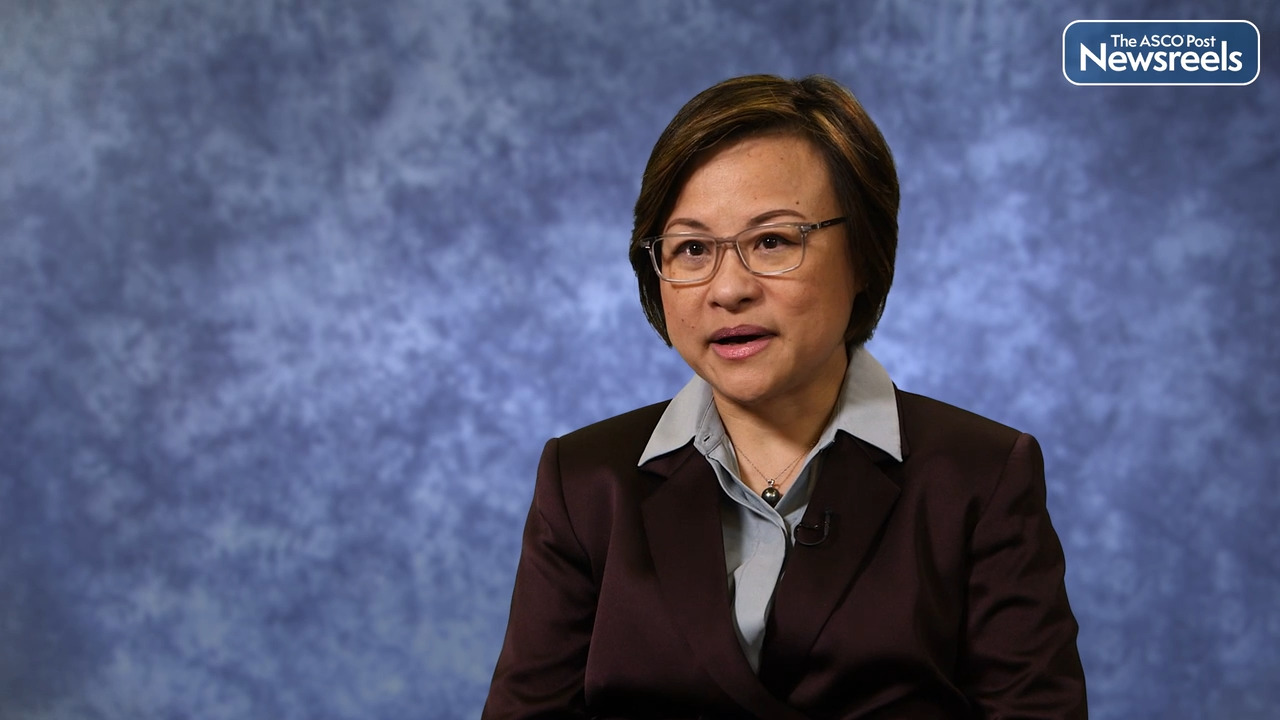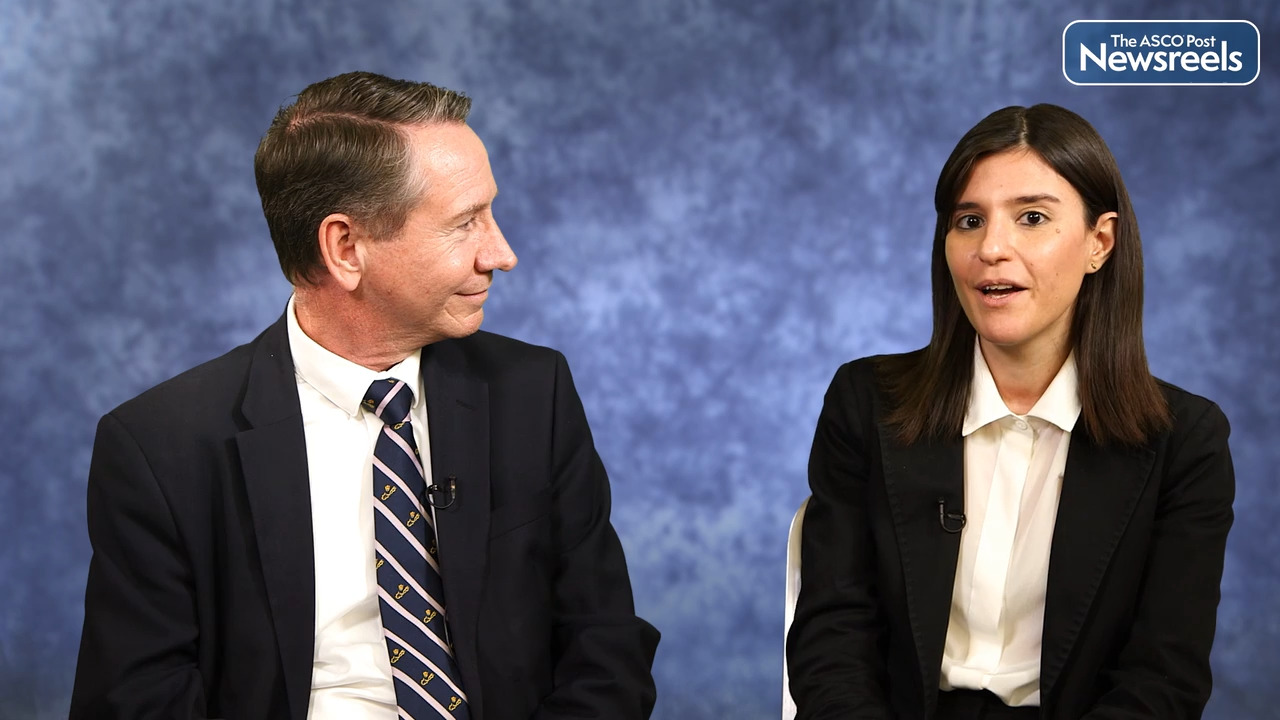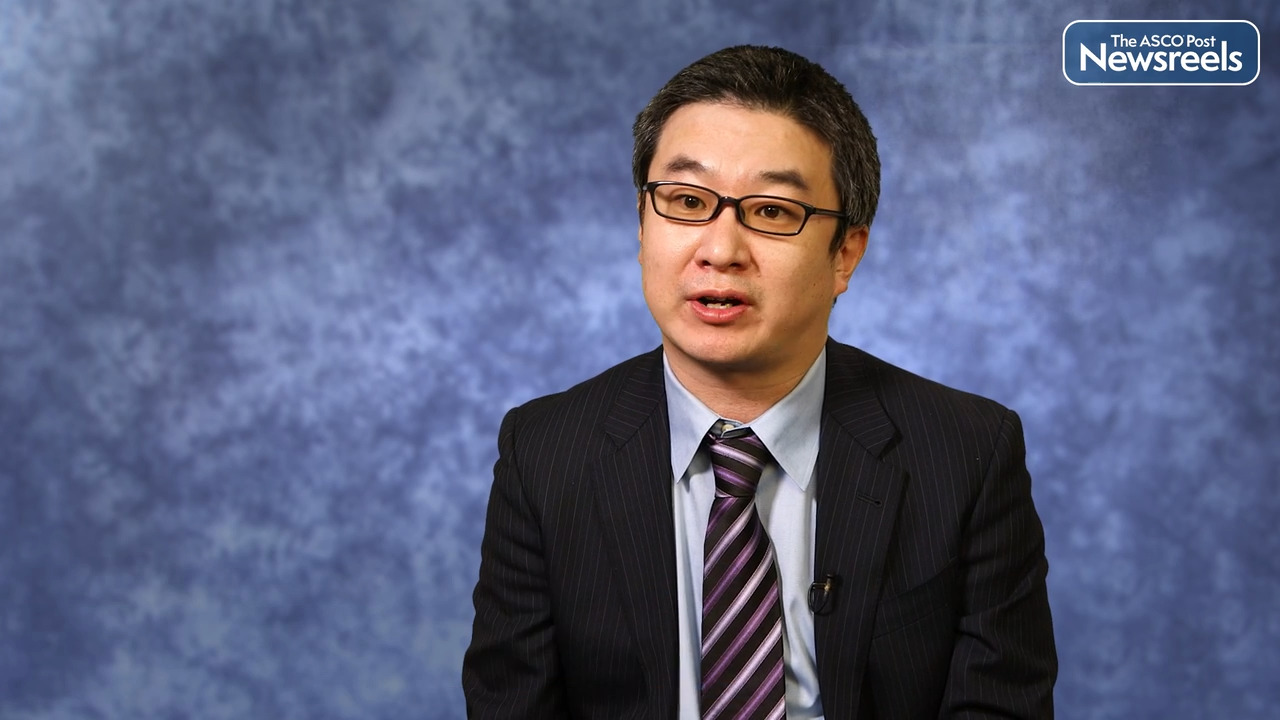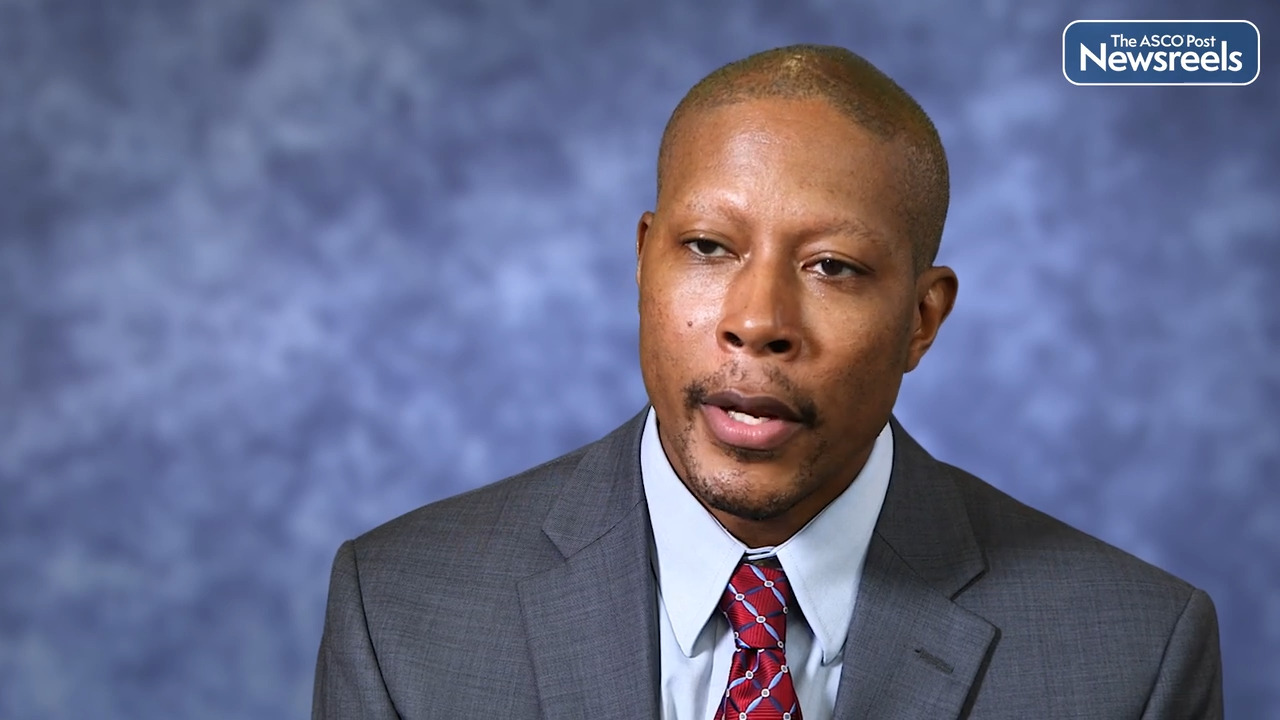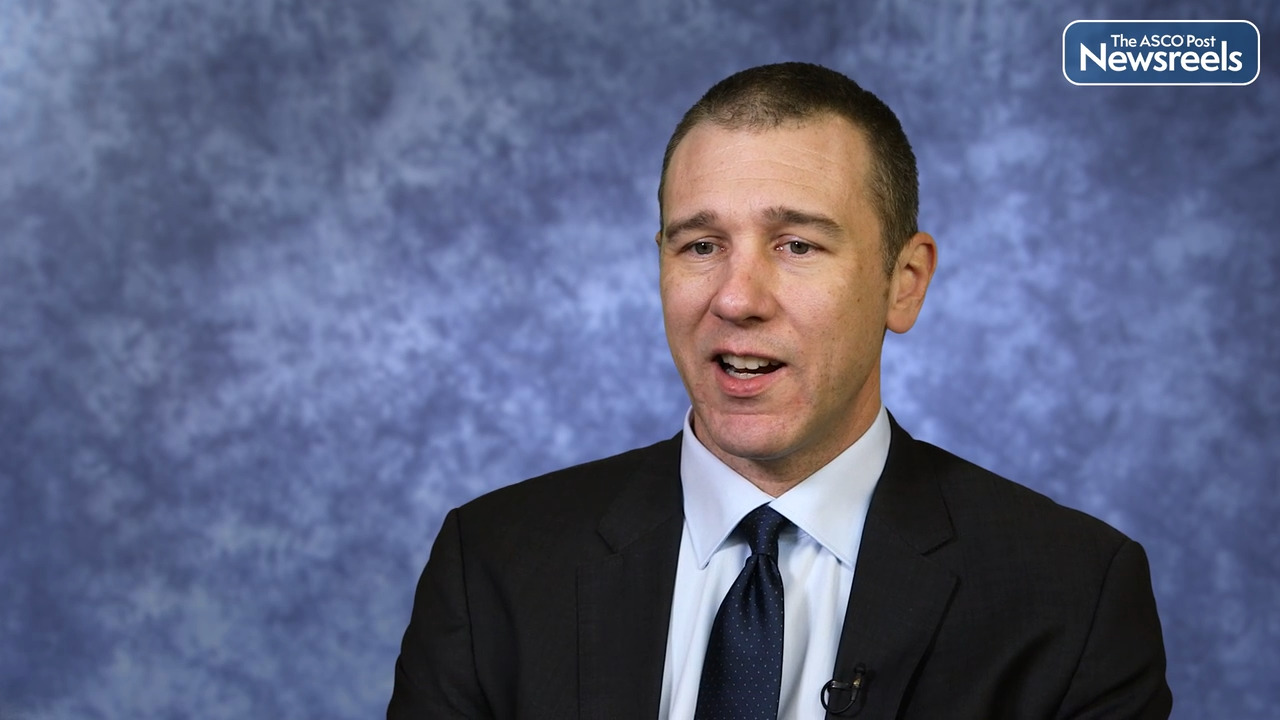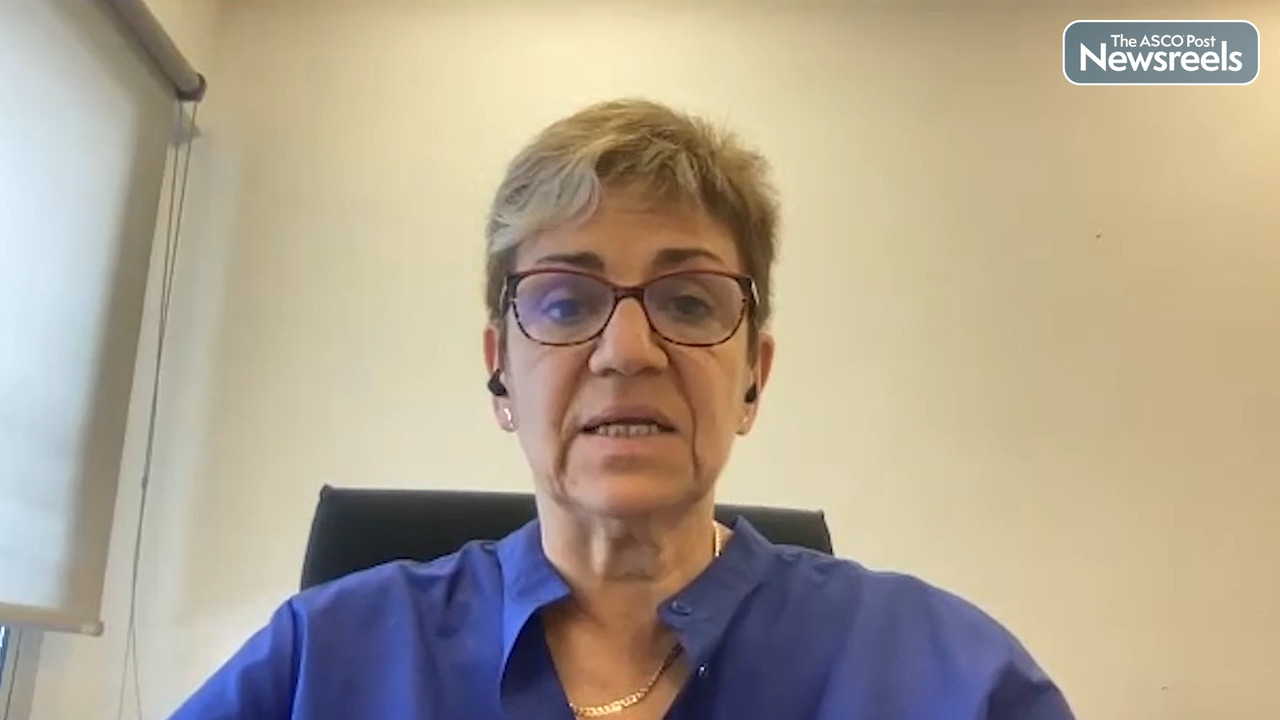Long-Term Follow-up of High-Dose Cytarabine and Autologous Stem Cell Transplantation in Mantle Cell Lymphoma
Long-term results of the phase III Mantle Cell Lymphoma Younger Trial were reported in the Journal of Clinical Oncology by Hermine et al. They showed a maintained advantage in time to treatment failure and an overall survival advantage with R-CHOP/R-DHAP (alternating rituximab plus...
Brentuximab Vedotin Combined With Chemotherapy in Pediatric Classical Hodgkin Lymphoma
On November 10, 2022, brentuximab vedotin was approved for use in combination with doxorubicin, vincristine, etoposide, prednisone, and cyclophosphamide for pediatric patients aged ≥ 2 years with previously untreated high-risk classical Hodgkin lymphoma.1 Supporting Efficacy Data Approval was...
Jennifer R. Brown, MD, PhD, on CLL/SLL: New Findings on Zanubrutinib vs Ibrutinib for Relapsed or Refractory Disease
Jennifer R. Brown, MD, PhD, of Dana-Farber Cancer Institute, discusses phase III findings of the ALPINE study, which showed that zanubrutinib is more efficacious and better tolerated than ibrutinib as a treatment for patients with relapsed or refractory chronic lymphocytic leukemia (CLL) and small lymphocytic lymphoma (SLL). In this first head-to-head comparison of the two BTK inhibitors, the superior progression-free survival of zanubrutinib was observed across all major subgroups, including high-risk patients (Abstract LBA-6).
Scientists Map Genetic Evolution of CLL to Richter Syndrome
Richter syndrome is an aggressive lymphoma that develops in up to 1% of patients with chronic lymphocytic leukemia (CLL) and it serves as an example of histologic transformation. While recent advances have transformed the treatment landscape of CLL, Richter syndrome remains associated with poor...
Pilot Study Investigates Axicabtagene Ciloleucel in Primary and Secondary CNS Lymphoma
The chimeric antigen receptor (CAR) T-cell therapy axicabtagene ciloleucel was deemed safe and showed encouraging signs of efficacy in a small pilot trial involving patients with lymphoma of the brain and/or spinal cord, according to findings presented by Caron A. Jacobson, MD, MMSc, and colleagues ...
Study Finds Adult Survivors of Pediatric Hodgkin Lymphoma Experience Significant Epigenetic Age Acceleration Associated With Neurocognitive Deficits
Research shows that long-term survivors of pediatric Hodgkin lymphoma are at an elevated risk for a variety of health conditions, including cardiopulmonary morbidity, cognitive impairment, and premature death, and could also be at heightened risk for the premature onset of dementia. A new study of...
Clinical Trial Lab-Based Eligibility Criteria Disproportionately Excluded Non-White Patients With DLBCL From Study Participation
A previous analysis by Khurana et al on the impact of inclusion/exclusion criteria in clinical trial design for patients with diffuse large B-cell lymphoma (DLBCL) found that up to 24% of patients treated with standard immunochemotherapy were excluded based on five lab-based criteria alone. A new...
Kathryn R. Tringale, MD, on Primary CNS Lymphoma: Initial Treatment Response in More Than 500 Patients
Kathryn R. Tringale, MD, of Memorial Sloan Kettering Cancer Center, discusses an assessment of 559 patients with primary central nervous system (CNS) lymphoma and the factors associated with consolidation therapy selection, outcomes after consolidation therapy accounting for patient factors, and patterns of disease failure. The initial treatment response was prognostic and predictive of relapse patterns (Abstract 557).
Eva Hoster, PhD, on Mantle Cell Lymphoma: Predictive Value of Minimal Residual Disease on Efficacy of Rituximab Maintenance
Eva Hoster, PhD, of Munich University, discusses results from the European MCL Elderly Trial, which confirmed the strong efficacy of rituximab maintenance in minimal residual disease (MRD)-negative patients with mantle cell lymphoma (MCL) after induction. Omitting maintenance based on MRD-negativity is thus discouraged. Considering the short time to progression, more effective treatment strategies should be explored in MRD-positive patients to improve long-term prognosis (Abstract 544).
Report Outlines Advance in Retreatment With CAR T-Cell Therapy in Patients With Relapsed or Refractory Non-Hodgkin Lymphoma or CLL
Researchers from the University of Pennsylvania’s Abramson Cancer Center presented preliminary results of an ongoing phase I clinical trial demonstrating successful retreatment with chimeric antigen receptor (CAR) T-cell therapy for patients whose cancers relapsed after previous CAR T-cell therapy. ...
Jia Ruan, MD, PhD, on Mantle Cell Lymphoma: Phase II Findings on Acalabrutinib/Lenalidomide/Rituximab
Jia Ruan, MD, PhD, of Meyer Cancer Center, Weill Cornell Medicine, and NewYork-Presbyterian Hospital, discusses trial results demonstrating that the triple chemotherapy-free combination of acalabrutinib, lenalidomide, and rituximab is well tolerated, highly effective, and produces high rates of minimal residual disease (MRD)-negative complete response as an initial treatment for patients with mantle cell lymphoma, including those with TP53 mutations. Real-time MRD analysis may enable treatment de-escalation during maintenance to minimize toxicity, which warrants further evaluation. An expansion cohort of acalabrutinib/lenalidomide/obinutuzumab is being launched (Abstract 73).
Stephen M. Ansell, MD, PhD, and Patrizia Mondello, MD, PhD: New Findings on How the IRF4 Gene Shapes Tumor Immunity in Follicular Lymphoma
Stephen M. Ansell, MD, PhD, and Patrizia Mondello, MD, PhD, both of the Mayo Clinic, discuss the 20% of patients with follicular lymphoma (FL) who relapse early and experience a poor prognosis. The researchers found that FLs with high levels of IRF4 expression are associated with a suppressive tumor microenvironment, and selective IRF4 silencing restores antilymphoma T-cell immunity. Further investigation is warranted to identify the mechanisms by which IRF4 controls tumor immunity to develop precision therapies for this population (Abstract 70).
Tomohiro Aoki, MD, PhD, on the Spatial Tumor Microenvironment and Outcome of Relapsed/Refractory Classical Hodgkin Lymphoma
Tomohiro Aoki, MD, PhD, of the University of British Columbia and the Centre for Lymphoid Cancer at BC Cancer, discusses a novel prognostic model applicable to patients with relapsed or refractory classical Hodgkin lymphoma who were treated with autologous stem cell transplantation. The model has shown the interaction between the biomarker CXCR5 on HRS cells (Hodgkin and Reed/Sternberg cells, hallmarks of Hodgkin lymphoma) with specific follicular T helper cells and macrophages, a prominent crosstalk axis in relapsed disease. This insight opens new avenues to developing predictive biomarkers (Abstract 71).
Tycel J. Phillips, MD, on Mantle Cell Lymphoma: New Findings on Glofitamab Monotherapy
Tycel J. Phillips, MD, of the City of Hope National Medical Center, discusses data that showed fixed-duration glofitamab monotherapy induced high and durable complete response rates in patients with mantle cell lymphoma (MCL) who received obinutuzumab pretreatment. This is one of the largest data sets and longest follow-ups reported with a CD20/CD3 bispecific monoclonal antibody for patients with relapsed or refractory MCL (Abstract 74).
Paolo F. Caimi, MD, on DLBCL: Outcomes After R-ICE Chemoimmunotherapy
Paolo F. Caimi, MD, of the Taussig Cancer Institute, Cleveland Clinic, discusses new findings showing that patients with diffuse large B-cell lymphoma (DLBCL) who achieve a complete response after salvage therapy with rituximab, ifosfamide, carboplatin, and etoposide (R-ICE) can achieve long-term disease control, regardless of the time to relapse from initial therapy, particularly if they proceed to autologous stem cell transplant (ASCT). These results suggest that second-line chemotherapy followed by ASCT and/or CAR T-cell therapy for chemosensitive and chemorefractory patients may maximize patient outcomes, regardless of time to relapse (Abstract 156).
Will Ibrutinib Replace Stem Cell Transplantation as First-Line Treatment for Mantle Cell Lymphoma?
In a recent trial of the European MCL Network, people with mantle cell lymphoma who received the Bruton’s tyrosine kinase inhibitor ibrutinib had rates of progression-free survival and overall survival that were on par with the current standard of care (high-dose immunochemotherapy followed by...
Breast Implants After Mastectomy Associated With Very Low Risk of ALCL
The incidence of anaplastic large cell lymphoma (ALCL) has surged in recent years—possibly because of the growing use of textured breast implants. Considering this trend, some patients with breast cancer who undergo mastectomy may wonder if the benefits of getting reconstructive implants are worth...
Novel Research Suggests New Way to Target Mantle Cell Lymphoma Using FOXO1 Inhibitors
Preclinical research has shown that mantle cell lymphoma is so critically dependent on the FOXO1 protein that by blocking its activity with an experimental drug, the cancer’s growth may be slowed, according to a new study published by Jang et al in the Journal of Clinical Investigation....
Cost-Effectiveness of Polatuzumab Vedotin-piiq Plus R-CHP and CAR T-Cell Therapy vs Standard of Care in DLBCL
In a study reported in the Journal of Clinical Oncology, Vijenthira et al found that front-line polatuzumab vedotin-piiq plus rituximab, cyclophosphamide, doxorubicin, and prednisone (R-CHP), second-line chimeric antigen receptor (CAR) T-cell therapy, or the combination would not be likely to be...
FDA Approves New Dosing Regimen for Asparaginase Erwinia Chrysanthemi (Recombinant)-rywn
On November 18, the U.S. Food and Drug Administration (FDA) approved a new Monday/Wednesday/Friday dosing regimen for asparaginase erwinia chrysanthemi (recombinant)-rywn (Rylaze). Under the new regimen, patients should receive 25 mg/m2 intramuscularly on Monday and Wednesday mornings and 50 mg/m2...
Cost-Effectiveness of COG Breast Cancer Screening Guidelines for Hodgkin Lymphoma Survivors Who Received Chest Irradiation
In a cost-effective analysis reported in the Journal of Clinical Oncology, Wong et al found that only the mammography component of the Children’s Oncology Group (COG) breast cancer screening guidelines for chest-irradiated Hodgkin lymphoma survivors was cost-effective; magnetic resonance imaging...
FDA Approves Brentuximab Vedotin in Combination With Chemotherapy for Pediatric Patients With Classical Hodgkin Lymphoma
On November 10, the U.S. Food and Drug Administration (FDA) approved the CD30-directed antibody-drug conjugate brentuximab vedotin (Adcetris) in combination with doxorubicin, vincristine, etoposide, prednisone, and cyclophosphamide for pediatric patients aged 2 years and older with previously...
Lisocabtagene Maraleucel Improves Event-Free Survival in Second-Line Treatment of Relapsed or Refractory LBCL
As reported in The Lancet by Manali Kamdar, MD, of the University of Colorado Cancer Center, Aurora, and colleagues, an interim analysis of the phase III TRANSFORM trial has shown significantly improved event-free survival with second-line lisocabtagene maraleucel vs standard-of-care salvage...
ECHELON-1 Shows Benefit for First-Line Brentuximab Vedotin Plus AVD in Advanced Hodgkin Lymphoma
The results of ECHELON-1 were presented by David J. Straus, MD, of Memorial Sloan Kettering Cancer Center, New York, at the 2022 National Comprehensive Cancer Network (NCCN) Annual Congress: Hematologic Malignancies. Dr. Straus said: “It is a great honor and privilege to present updated results...
High-Dose Chemotherapy and Stem Cell Transplant vs CAR T-Cell Therapy for Resistant DLBCL
Which is the preferred second-line treatment option for patients with relapsed or refractory diffuse large B-cell lymphoma (DLBCL): high-dose chemotherapy and autologous stem cell transplantation (ASCT) or chimeric antigen receptor (CAR) T-cell therapy? This was the subject of a debate at the...
‘TRANSFORMING’ Our Thinking About Second-Line Therapy for High-Risk Large B-Cell Lymphoma: Bring in the CARs
As reported in The Lancet by Kamdar et al,1 and summarized in this issue of The ASCO Post, the international phase III TRANSFORM trial was completed in 184 patients with primary refractory or early (≤ 12 months) relapsed large B-cell lymphoma (LBCL). Patients were randomly assigned to receive...
Addition of Brentuximab Vedotin to Chemotherapy in Pediatric High-Risk Hodgkin Lymphoma
As reported in The New England Journal of Medicine by Castellino et al, the phase III Children’s Oncology Group (COG) AHOD1331 trial showed improved event-free survival with brentuximab vedotin plus chemotherapy vs standard chemotherapy in previously untreated pediatric patients with high-risk...
PET-Adapted Therapy for Bulky Stage I/II Classical Hodgkin Lymphoma
As reported in the Journal of Clinical Oncology by Ann S. LaCasce, MD, MMSc, and colleagues, the phase II CALGB 50801/Alliance trial has shown that a positron-emission tomography (PET)-adapted treatment strategy allowed many patients with bulky stage I/II classical Hodgkin lymphoma to avoid...
Response-Adapted Ultra–Low Dose Radiation Achieves Complete Response in Majority of Patients With Orbital Indolent B-Cell Lymphomas
Using a novel response-adapted ultra–low dose radiation therapy strategy, researchers at The University of Texas MD Anderson Cancer Center observed a 90% complete response rate in patients with orbital indolent B-cell lymphomas. Results were presented by Pinnix et al at the 2022 American Society...
Managing Lymphomas in the Future: Some Bright Spots Are Emerging
Although standard therapies may provide long-lasting remissions for many patients with various subtypes of lymphoma, there is a critical need for new strategies for the sizable high-risk subset. At the 2022 Pan Pacific Lymphoma Conference, four experts in the field described future therapies for...
What Is the Best Induction Regimen for Newly Diagnosed PCNSL?
Primary central nervous system lymphoma (PCNSL) accounts for less than 1% of all non-Hodgkin lymphomas and between 3% and 4% of all brain tumors, with an age-adjusted incidence rate of four cases per million persons per year. Approximately 1,500 new cases are diagnosed each year in the United...
Changing the Algorithm for Relapsed or Refractory Large B-Cell Lymphomas
Despite a significant potential for cure, relapsed and refractory large B-cell lymphomas (LBCL) comprise the most common cause of lymphoma-related mortality. Sequential relapses reflect the limits of repeated exposure to chemotherapy, even when delivered at high doses. More than 30 years ago,...
Determining Prognosis in Aggressive Lymphomas: Integrating Liquid Biopsy Into Imaging Assessment
The incorporation of blood-based measurements—ie, “liquid biopsies”—into imaging assessment may refine the accuracy of prognosis in aggressive lymphomas, as described by David Kurtz, MD, PhD, Assistant Professor in the Division of Oncology, Stanford University Medical Center, in a talk at the 2022...
Axicabtagene Ciloleucel Improves Event-Free Survival vs Standard Care in Second-Line Treatment for Large B-Cell Lymphoma
As reported in The New England Journal of Medicine by Frederick L. Locke, MD, of the Department of Blood and Marrow Transplant and Cellular Immunotherapy, H. Lee Moffitt Cancer Center, Tampa, Florida, and colleagues, the phase III ZUMA-7 trial in large B-cell lymphoma has shown improved event-free...
Trends in Incidence of Cutaneous T-Cell Lymphoma in the United States
In a study reported in a research letter in JAMA Oncology, Cai et al found that the incidence of cutaneous T-cell lymphoma increased in the United States between 2000 and 2018. The study involved data from 18 Surveillance, Epidemiology, and End Results (SEER) Program registries for 2000 to 2018. A...
An Aggressive Type of Non-Hodgkin Lymphoma Threatened My Life
I was just 31 and about to give birth to my fourth child, Yitzchok, when I received a diagnosis of primary mediastinal large B-cell lymphoma. The news was terrifying and crippling. For months, I had been experiencing shortness of breath, coughing, and a pain in my left shoulder, all of which were...
FDA Approves Pemigatinib for Patients With Myeloid/Lymphoid Neoplasms and FGFR1 Rearrangement
On August 26, the U.S. Food and Drug Administration (FDA) approved pemigatinib (Pemazyre), a selective fibroblast growth factor receptor (FGFR) inhibitor, for the treatment of adults with relapsed or refractory myeloid/lymphoid neoplasms with FGFR1 rearrangement. Myeloid/lymphoid neoplasms with...
Tisagenlecleucel for Relapsed or Refractory Follicular Lymphoma
On May 27, 2022, tisagenlecleucel, a CD19 chimeric antigen receptor (CAR) T-cell therapy, was granted accelerated approval for adults with relapsed or refractory follicular lymphoma after two or more lines of systemic therapy.1 Supporting Efficacy Data Approval was based on the multicenter ELARA...
Anna Sureda, MD, PhD, on Large B-Cell Lymphoma: New Data on Axicabtagene Ciloleucel vs Standard of Care
Anna Sureda, MD, PhD, of the University of Barcelona and the Catalan Institute of Oncology, discusses phase III clinical and patient-reported outcomes from the ZUMA-7 trial, which showed that axicabtagene ciloleucel was superior to second-line standard-of-care treatment in patients 65 years or older with relapsed or refractory large B-cell lymphoma (Abstract S211).
Rituximab, Lenalidomide, and Ibrutinib With Sequential Addition of Chemotherapy in Newly Diagnosed DLBCL: Smart Start Trial
In a single-institution phase II trial (Smart Start) reported in the Journal of Clinical Oncology, Jason Westin, MD, MS, and colleagues found that initiating treatment with rituximab, lenalidomide, and ibrutinib (RLI) followed by the sequential addition of chemotherapy resulted in high response...
Lisocabtagene Maraleucel in Second-Line Treatment of Large B-Cell Lymphoma
On June 24, 2022, lisocabtagene maraleucel was approved for adults with large B-cell lymphoma (LBCL) who have (1) refractory disease to first-line chemoimmunotherapy or relapse within 12 months of first-line chemoimmunotherapy; or (2) refractory disease to first-line chemoimmunotherapy or relapse...
Expert Point of View: Alexey V. Danilov, MD, PhD
According to Alexey V. Danilov, MD, PhD, Professor and Co-Director, Toni Stephenson Lymphoma Center, City of Hope, diffuse large B-cell lymphoma (DLBCL) refractory to chemotherapy represents an unmet medical need, with data from the SCHOLAR-1 study demonstrating a median overall survival of...
Epcoritamab Under Study in Difficult-to-Treat Large B-Cell Lymphoma
Subcutaneous epcoritamab, a bispecific antibody, has demonstrated deep and durable responses in a large expansion cohort of patients with relapsed or refractory large B-cell lymphoma (LBCL), according to late-breaking data presented during the European Hematology Association (EHA) 2022 Congress in...
Risk Prediction Models for Coronary Heart Disease and Heart Failure After Treatment for Hodgkin Lymphoma
In a study reported in the Journal of Clinical Oncology, de Vries et al developed risk models for predicting the development of coronary heart disease and heart failure in patients treated for Hodgkin lymphoma. Study Details The prediction models were developed in a Dutch cohort of 1,433 5-year...
First-Line Lenalidomide/Rituximab vs Rituximab/Chemotherapy With Rituximab Maintenance for Advanced Follicular Lymphoma
As reported in the Journal of Clinical Oncology by Franck Morschhauser, MD, PhD, and colleagues, 6-year results from the second interim analysis of the phase III RELEVANCE trial show similar progression-free and overall survival with lenalidomide/rituximab (R2) vs rituximab/chemotherapy (R-chemo)...
Study Reveals Potential Genomic Contributors to the Development of DLBCL
By searching previously ignored regions of the genome, researchers have found a multitude of new genetic mutations that may contribute to diffuse large B-cell lymphoma (DLBCL). These findings were published by Bal et al in Nature. “Our findings not only show that these mutations can contribute to...
Brentuximab Vedotin Plus AVD vs ABVD for the First-Line Treatment of Early-Stage Unfavorable-Risk Hodgkin Lymphoma
In a European phase II trial (BREACH) reported in the Journal of Clinical Oncology, Fornecker et al found that brentuximab vedotin (BV) plus doxorubicin, vinblastine, and dacarbazine (BV-AVD) improved the rate of positron-emission tomography (PET)-negative status after two cycles of treatment vs...
Consolidation Radiotherapy vs Autologous Stem Cell Transplantation for Primary CNS Lymphoma
As reported in the Journal of Clinical Oncology by Houillier et al, 8-year follow-up in the French phase II PRECIS trial has shown a maintained event-free survival benefit with autologous stem cell transplantation (ASCT) vs whole-brain radiotherapy (WBRT) as consolidation in patients aged ≤ 60...
Zandelisib in Continuous or Intermittent Dosing Schedules With or Without Rituximab for Relapsed or Refractory B-Cell Malignancies
In a first-in-patients phase Ib study reported in The Lancet Oncology, John M. Pagel, MD, PhD, and colleagues identified the safety profiles of the PI3Kδ inhibitor zandelisib given in intermittent vs continuous dosing schedules with or without rituximab in patients with relapsed of refractory...
ECHELON-1 Trial: Brentuximab Vedotin With Chemotherapy Offers Survival Benefit in Stage III or IV Hodgkin Lymphoma
Brentuximab vedotin plus doxorubicin, vinblastine, and dacarbazine (a regimen known as A+AVD) significantly reduced the risk of mortality vs standard treatment with doxorubicin, bleomycin, vinblastine, and dacarbazine (ABVD) in patients with previously untreated stage III or IV classical Hodgkin...
